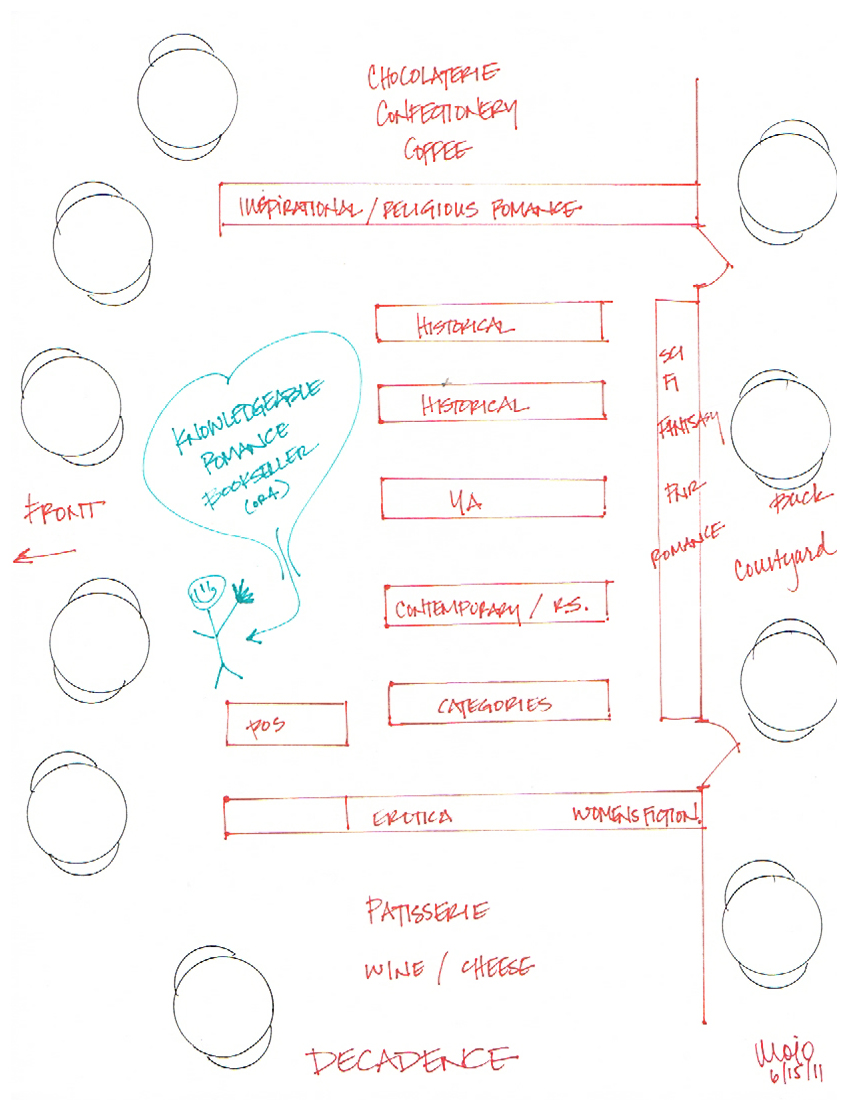 My editor and partner, Theric Jepson, who runs Peculiar Pages alongside my running of B10 Mediaworx, made some sort of joke on Twitter (don’t remember the joke), and Wm Morris of A Motley Vision (a MoLit blog) had an idea. And the idea was to skewer the 19th-century literary tradition of using Mormons as stock villains in pulp fiction by turning the Mormons into the protagonists instead of the antagonists.
My editor and partner, Theric Jepson, who runs Peculiar Pages alongside my running of B10 Mediaworx, made some sort of joke on Twitter (don’t remember the joke), and Wm Morris of A Motley Vision (a MoLit blog) had an idea. And the idea was to skewer the 19th-century literary tradition of using Mormons as stock villains in pulp fiction by turning the Mormons into the protagonists instead of the antagonists.
Plans were being made. I felt no compunction to submit a story to this anthology of pulp fiction because a) I don’t read pulp fiction; I read trashy romance novels aka porn for women and so b) I didn’t feel qualified to write anything for it. But then Wm posted an update on AMV saying, “I’d like to see X, Y, Z, and A, B, and C.” Well, I thought. I could do Y, Z, and B. So I did.
When I got it done and Wm liked it (Theric was not my editor this time), I had second thoughts. Considering I’m kind of, you know, responsible for its publication, I figured there would be seen some sort of “in,” or conflict of interest. Theric and I discussed it and decided I’d withdraw it, but Wm thought my withdrawing it was a bad idea. So, okay. Onward.
What has resulted is the most wonderful collection of tales of the supernatural and bizarre. Supernaturally bizarre. Or bizarrely supernatural. Whatever. Including! Get this! TWO graphic novels!
So here’s a little taste of my story, of a Mormon self-styled “nun” packing nuclear weapons powered by cold fusion to zap demons left and right.
Allow Me to Introduce Myself
He’s never been here.
I can tell because he can barely keep from puking into the swamp, and his neoprene skin is making him fidget and wiggle.
Definitely a roving monk.
“Gas mask?” I ask and offer him something that very much resembles Cthulhu.
“I am not wearing that,” he snaps.
“Little bit touchy, are we, Monk?”
“Shut up, Nun.” He doesn’t offer his name. Probably something boring like John. “Pray.”
I do.
The sun is just setting when he locks his 0.75-gigajoule disperser down to his titanium gauntlet with much exaggeration. “Got your affairs in order?”
Break a leg in nun-and-monk speak.
I stand for a minute and stare at his gauntlet and matching gun, both so much more decorated than mine, engraved with lightning bolts. My gauntlets and weapons are engraved with paisleys. Pretty, but…
Pretty.
Feminine.
To do a job like this.
I grit my teeth and pull my left-hand disperser out of its case, lock it down to the gauntlet, lay the telescoping barrel along my titanium-covered index finger, then lock it down with tiny clips.
Point and shoot.
Once my right extremity is similarly burdened, I click my night-vision goggles down over my specs, and lead the way into the twilight, into the swamp where it’s already dark as midnight, downdowndown, gradually being covered in slime until I’m chest deep in it.
Yeah, it stinks. But this is where I work, so I’m used to it and I’ve already stuffed my nose with Mentholatum. I have the clearest sinuses in the Atchafalaya basin.
I haven’t been allowed to go into the swamp for the last two weeks, since the flood waters from up north began rising in earnest. It’s taken that long for my sensors and weapons to be recalibrated for the extreme change in environment. The animals have been driven up out of the swamp and what crude oil was left on land has been pulled back into the water. With water comes mold, fungus, mosquitoes, and other diseases, but that’s not a concern for hunters. The crude, well…I don’t know how—or even if—the sludge will react to the extra radioactivity my partner brings, which is orders of magnitude above mine.
But we don’t question, because to question is to die. The general authorities overseeing our gadgetry supply us with whatever we need to do our jobs.
“Why aren’t we taking your boat?” Only now do I detect a mid-Utah accent. Great. A JelloBeltian.
I grab a palm full of water and let it trickle back out through my fingers. I still have a hand full of refuse. “Look at that. It’s soup. Chock full of plants. Oil. Trash from the floods. I don’t want my motor bound up in—” I point to a heavy drape of Spanish moss that floats on the surface. He looks around. Spanish moss is everywhere. “—that.”
He says nothing and we trudge through the thick water.
“Crocodiles?” he asks after a while.
“’Gators, rather,” I say. “They won’t bother us.”
“I know that,” he snaps. Again. He might as well be a ’gator, he’s snappin’ so much. He’s not questioning, but he sure is murmuring.
Murmuring doesn’t get you dead. It might get you injured, though. Very distracting activity, murmuring. I’d rather he not murmur around me when he’s got enough energy to melt a ton of steel.
(I bet it kills him he can’t control a whole gigajoule.)
“Where were you last?” I ask conversationally as we wade through slime, our dispersers primed to shoot.
“Gobi Desert,” he answers, and I catch something wistful in his voice.
“You liked it there.”
“Yes.”
“What were you hunting?”
“Had a band of specter demons going through the villages. Wiped ’em out.”
Specter demons.
Psychiatrists call it “auditory or visual hallucinations,” a symptom of several psychiatric disorders, but we know what they are: Lucifer’s army, waging war on those of us with bodies—on our bodies—because he can’t make any real headway in his war on Father and Mother.
Specter demons are the grub worms of the psyche, chewing up people’s neural pathways like grass roots, leaving dead lawn behind. We’re allowed to attempt to heal the damage, but we mostly can’t. We’re only required to get the demons out of our plane and bar them from future entry.
Like internet trolls.
But there are a lot of internet trolls.
At the blip of a shadow in the corner of my eye, I point and blast. Swamp water explodes and covers us like debris-ridden oil rain.
“Eeewww.” Even I’m grossed out as I flick it off my neoprene skin.
The monk rubs his fingers together, brings the substance to his nose. “Well, you got ’em.”
Good. The sacrifice of my skin will not have been vain.
Demolition demons are the worst. They usually show up in hospitals, disguised as Staph infections, gangrene, pneumonia. The advanced demolitionists manifest as cancer catalysts. The more skilled a demolitionist, the greater power it has over a cell’s ecosystem. Medicine will arrest what it can, and we may be able to do the rest, if we get there in time.
No demon has the power to kill a human; they can only sow the seeds of disease—physical or mental—and let nature take its course. That’s the pact the Parents have with us, their children: Lucifer cannot kill us. Yet he continues to search for a way to do so and this, the Atchafalaya basin, is one of his biggest training grounds and laboratories.
I don’t know why he bothers.
Generally, we don’t interfere in a disease process. There is a time and a season for everything. Repairing psychological damage—attempting to, anyway—is different. The schizophrenics, bipolars—not all are caused by specters, just as not all diseases are caused by demolitionists. But it’s very rare that science loses a human body to disease if its turn on earth isn’t done. Not so with specter-induced mental illness.
Several hundred demolitionists burst up in rapid succession, coming for us. They’re small, about the size of a barn owl, and usually invisible to all but us.
It takes both my 3-megajoule dispersers and the monk’s behemoth to pop that ambush right on back to hell, for lack of a better word. Technically outer darkness either hasn’t been built yet or stands empty awaiting its prisoners once this Earth is cast back into the celestial recycle bin.
“Hmm,” I say, and because I can’t keep myself from stating the obvious, “this is not normal.”
The swamp waters aren’t as still as usual. I don’t know if it’s the oil or if there are more demons here than the water can hide. With pelts of moss and a slick over it, it should be harder to displace than water alone.
A battalion bursts out of the water and charges us. They’re no match for us both, but the sheer number of them is cause for concern.
So. The flooding and oil aren’t the only reasons I have a roving monk at my side.
… the unique dangers. I wish I knew what that meant.
Generally, we only make a little headway each night when we hunt. Lucifer replaces the demons almost as fast as we can dispatch them, but never quite fast enough. Out of the hundreds or—like tonight—the thousands that we send back to him in an evening, perhaps collectively, we will have lessened their numbers by a factor of ten.
Sometimes I wonder why we bother.
The water settles.
“I don’t know why we bother,” says the monk wearily.
I look at him sharply. Can he read my mind? I’ve heard it’s a possibility, a gift given to the upper echelons of our kind.
I answer by rote: “So someone can live and fulfill the measure of their creation.”
“Deb, I heard it in correlation meeting last year. And the year before that. And the year before that. Don’t want or need to hear it while I’m hunting.”
He’s jaded.
Bitter.
“How old are you?”
“Four twenty-three.”
Oh. I’m only fifty-eight. I feel that I’ve missed some important information.
No wonder he didn’t like having a nun—and such a young one—take the dictation.
He knows my name. He probably knows everything about me.
“What’s your name?”
“Ezekiel Alleyn.”
Oh. My. Stars.
The water bubbles and I don’t dare think about him as we go about magnifying our callings with weapons powered by cold fusion. Not magic, not supernatural.
Technologically advanced and genetically enhanced.
Like the demons.
Like the hunters.
There is no supernatural, no magic, only puzzles that haven’t been solved. Even we hunters don’t know how most of our technology works, and I’ve always wondered how much the general authorities who build this stuff know.
I figure they get their instructions like Noah did: Here are the blueprints and the supply list. Go to it. Don’t ask any questions.
The hunters’ DNA is altered when we’re set apart for our callings. I don’t know how that works, either, but considering Jesus healed the blind and the lepers…
Something brushes up against the back of my leg, wiggles its way between my feet. “Bonjour, mon ami.” The smallish ’gator flips his tail up behind me, making a splash.
The monk steps away to escape the oil-and-debris rain.
“You have a lot of friends here?” he asks.
What an odd question. “Of course I do.” He, of all people, should know the extent of my enhancements. I couldn’t work this swamp without having the flora and fauna understanding of and sympathetic to my purpose.
The ’gator maneuvers through my legs, and around again, making a figure eight, like a cat. He wants my attention, so I trudge to a log and he climbs out of the water so I can scratch his oil-slicked head with my titanium claws.
He almost purrs.
“Non, chèr,” I tell him in Cajun. He doesn’t understand English. “I can’t get rid of him, sorry. He’s my boss.”
“He’s whining, Deb. What are you doing to this place?”
“He’s just a baby.”
“A baby you’ve spoiled rotten. Tell him to go home. We have work to do.” I translate as kindly as I can and he slides back into the sludge, but not without a swipe of a tail at the back of Ezekiel’s knees.
He glares at me. “You tell him he better never do that again.”
We spend the night sludging through the swamp, sending demons back to Lucifer. Our dispersers mess with their molecular structure somehow—or at least, that’s how it’s been explained to me.
We don’t speak. Ezekiel—
Oh. My. Stars. I can’t believe I’m hunting with Ezekiel.
—isn’t familiar with this terrain and I need to keep the awe out of my eyes and voice.
“Don’t believe everything you hear,” he mutters.
I don’t like that he can read my mind. I feel…naked. I don’t look so good naked.
“Are you trying to mess me up?” I ask. “Pick a fight? Because if so, I’ll take some personal time for the rest of the night and let you do this by yourself.”
“Watch your mouth, Sister Judge.”
I gulp. That’s the second time he’s dressed me down tonight, on top of his surliness at being here. It makes me rethink my abilities, my attitude.
“Don’t start doubting yourself now,” he grumbles as we trudge through the swamp. “I don’t need a hunter with a self-esteem problem at my back.” I purse my lips. “And no, I’m not here to kill you… Yet.”
If you like science fiction, fantasy, paranormal, zombies, werewolves, ghosts, goblins, and things that go bump in the night, go get the whole collection! It’s only available in digital now from the B10 site and the Kindle store, but print is forthcoming in the next couple of weeks.










 Yesterday I had surgery for the first time ever (not counting wisdom teeth). It was elective and went well, so everything’s fine.
Yesterday I had surgery for the first time ever (not counting wisdom teeth). It was elective and went well, so everything’s fine.
